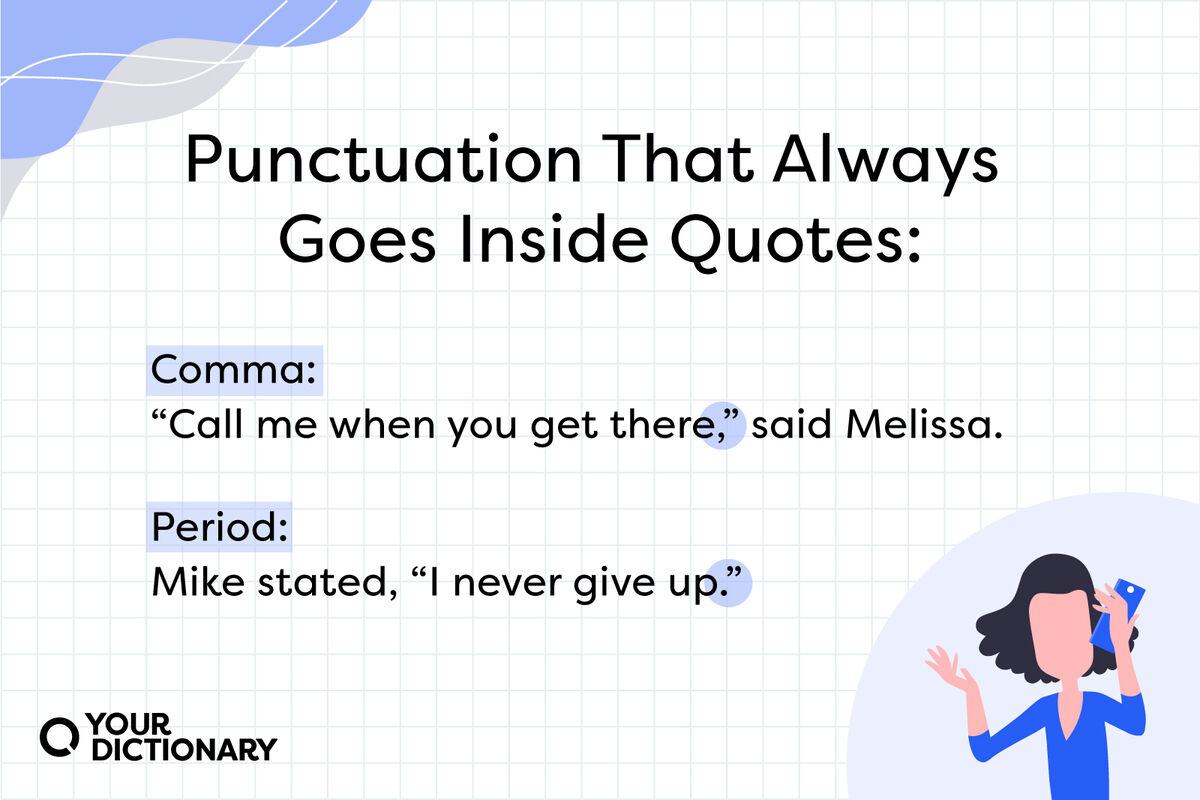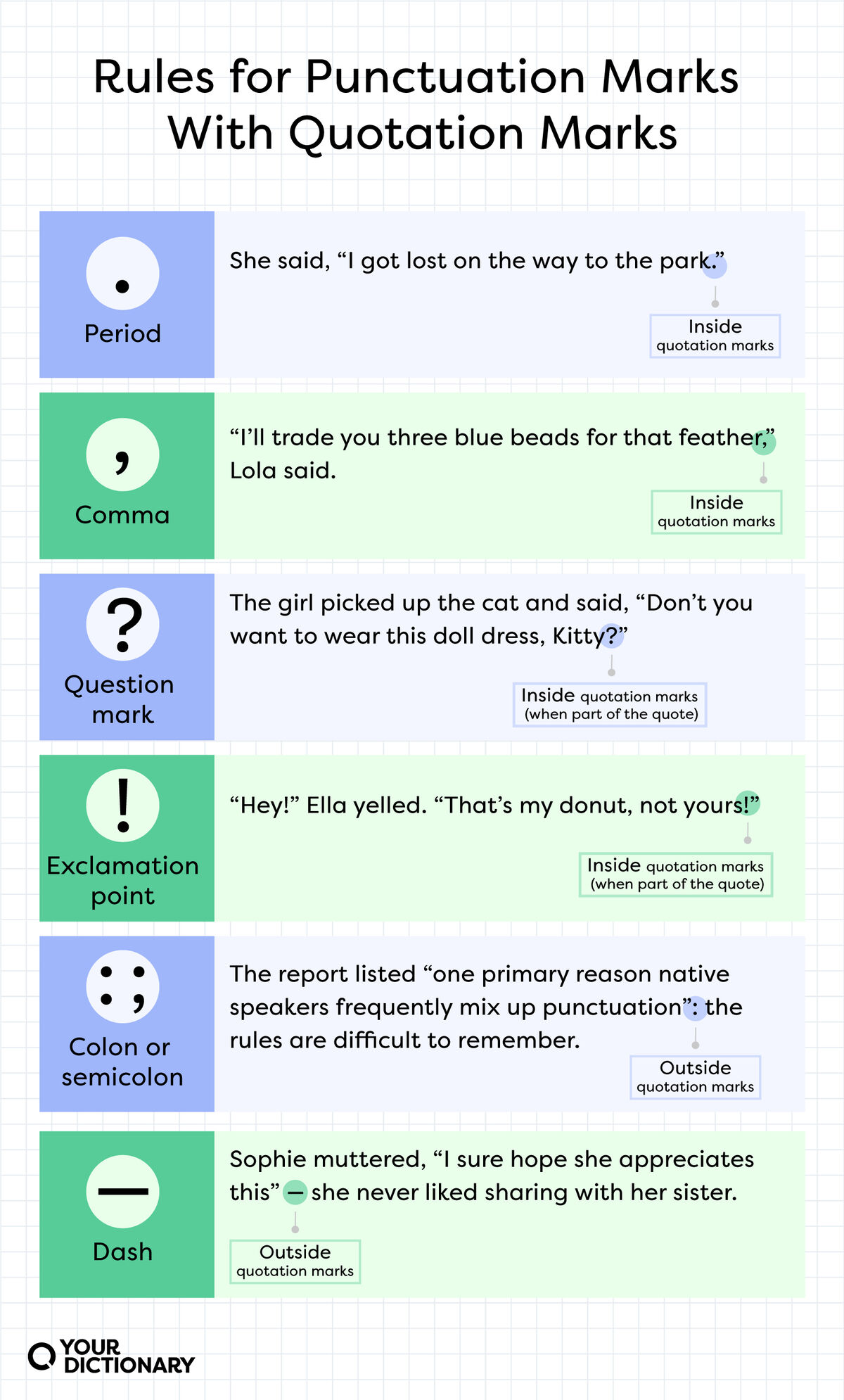
Wasn’t it Eleanor Roosevelt who said, “Be confident, not certain?” Wait a second — putting that question mark inside the quotation marks makes it sound like Mrs. Roosevelt was asking a question.
As you can see, punctuation placement within quotation marks all depends on the type of punctuation mark used, where a quote falls in a sentence, and what exactly is quoted.
Period
In American English, we use punctuation marks such as periods and commas to signal that a quote is finished. That's why periods always go inside quotation marks.
When the sentence ends with a quote, finish both the quote and the sentence with a period (no extra punctuation needed).
- Anne called the boys "mean and nasty."
- Mike stated, "I never give up."
- "I'll be going to the party later." Ivan smiled at Pearl. “Hope to see you there.”
- Alan's assignment is to read Wordsworth's "Daffodils."
Comma
When the quote falls at the beginning or middle of a sentence, always put the comma before the quotation mark before adding more words to the sentence.
- “Call me when you get there,” said Melissa.
- “Let’s get coffee sometime,” offered Saul.
- "Don't be late for class," the teacher advised.
- "I am never talking to him again," my sister said angrily.
Question Mark
If the quoted material is a question, the question mark should be inside the quotation marks.
It doesn’t matter where the quotation falls in the sentence.
- Anthony asked, "Can we have pizza again for dinner?"
- “When will it stop raining?” complained Vera.
However, if the question mark is not directly part of the quote, then the punctuation should go outside of the quotation marks.
- Who said the line, "I'm the king of the world"?
- How did the coach know it was me who said, "I don't want to be on this team"?
Semicolon
If the quote comes before the semicolon, then the semicolon goes outside of the quotation marks.
- George’s favorite poem is “Harlem”; he recited it at his graduation.
- I don’t know what the teacher means by “sometime next week”; which day should I turn the homework in?
Colon
When a quote comes right before a colon, the colon stays outside the quotation marks.
- The speaker listed three "secrets of success": confidence, perseverance, and passion.
- Three people volunteered to sing “Don’t Stop Believing”: Andrew, Marian, and Naya.
Exclamation Point
The same rule applies to exclamation points. When the quote is an exclamation, the exclamation point goes inside the quotes — no matter where it is in the sentence.
- Mom shouted, "Don't throw the ball in the house!"
- "Watch for the ice!" I cried out.
But sometimes, the exclamation point belongs to the sentence, not the quote. Then the exclamation point goes outside the quotation marks.
- I love the song “Take Me Home, Country Roads”!
- You have to read the article "UFOs Are Real"!
Dash
Like colons and semicolons, dashes also go outside quotation marks if they’re part of the sentence around the quote.
- She laughed and said, "I don't think he will pass his driving test" — right before he pulled up in front of the house.
- Pierre wrote an article called “The Hidden Secrets of Wyoming” — his publisher immediately asked him to expand it into a book.
There is an exception to this rule in fiction: If the speaker suddenly stops speaking, you can use a dash to show the interruption. Then it goes inside the quotation mark.
- “I can’t hear you! Please speak —” Manny yelled before the phone died.
- “Class, turn in your —” Mrs. Taylor suddenly stopped talking.
Helpful Hack
You may find situations where someone needs to input a specific word or phrase into a computer. If you include the punctuation in the quoted section, this may cause the user to input the punctuation with the word.
In these cases, put the punctuation outside the quotes:
- My user ID is “IM47g”.
- Did you try the password “mycatisawesome”?
How To Remember if Punctuation Goes Inside Quotes
Remember which punctuation marks go where with this tip:
- Think of your warm, cozy home. Some animals, like your pets, are always welcome inside, but other, wilder animals (bears or crocodiles, for example) should probably stay outside.
Now think of quotation marks as the walls to your cozy house, and other punctuation marks as those different types of animals.
- Commas and periods are small, helpless animals; they go inside.
- Exclamation points and question marks are larger animals; they sometimes go inside.
- Colons, semicolons, and dashes are irregular, wild animals; they stay outside.

British Rules for Quotation Marks
While commas and periods at the end of quotes always go inside the quotation marks in American usage, British English is different.
Commas and periods that aren’t part of the quoted material go outside the quotation marks in British English.
- American English - Anne called the boys "mean and nasty."
- British English - Anne called the boys "mean and nasty”.
In both American English and British English, when it’s part of the quote, all punctuation goes inside the closing quotation marks. This includes commas, periods, question marks, and exclamation points.
Punctuation that belongs to the sentence goes outside the quotation marks.